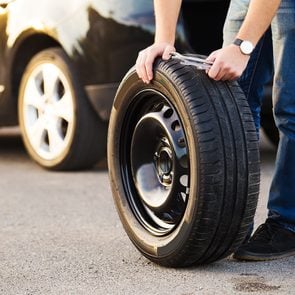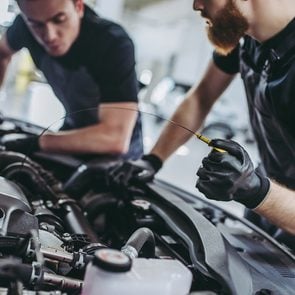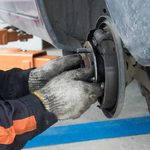What to Do If Your Car Shakes When Braking

Sometimes cars shake when you brake. And while pulsating while braking is usually an easy fix, any issue with a vehicle’s braking system is a safety concern.
Tires may be to blame
One possible cause of shaking when you apply the brakes, especially at high speeds on the highway or when going downhill, is your tires. This is the first thing you should investigate if you experience shaking while braking. Your wheels may be out of alignment, or you may have a bad tire that is unbalanced. (Learn how to extend the life of your tires.)
Your car service provider can check it out and fix the issue easily if there is a problem. This might mean that you have to buy a new tire or two (check your tire warranty if a replacement is needed).
They may suggest a front-end realignment, which is fine, but understand that it will not be a permanent fix. You can do your own alignment work but it requires expensive diagnostic equipment and is not considered a smart DIY task since most garages charge less than $100 for the service.
Brakes could be the culprit
Perhaps the leading cause of shaking when you brake, especially at highway speeds, is in the braking system itself. Most cars today have disc brakes in the front wheels, and often in the rear wheels as well (although economy cars still have drum brakes in the rear wheels). Disc brakes rely on a metal rotor that is coupled to each wheel and spins along with it. Stopping happens when you step on the brake pedal, which causes calipers (a little like the ones on your bicycle) to clamp down on the rotor to slow and then stop it. (Read up on brake calipers—and how to tell if they’re damaged.)
Eventually, friction from your brake pads can cause wear on the rotors, causing them to become uneven. Or, heat buildup from braking, especially on frequent inclines, can cause one of the rotors to warp.* Then, when the brakes are applied, contact between the pad and rotor can be a bit bouncy, causing a shimmy that is felt mostly in the steering wheel. An auto mechanic may be able to adjust, shim or resurface the rotors to compensate for the unevenness, but replacing them is a surer bet, and a relatively easy DIY job for those comfortable under the hood, too. And, some mechanics recommend that you always replace rotors and brake pads at the same time. Rotors can warp from disuse, as well. If a vehicle hasn’t been moved for a long time, the rotors may warp.
Next, find out what these strange car noises really mean.
*Editor’s Note: There are two trains of thought regarding warped rotors, with some mechanics agreeing with the statements made here, and others asserting that uneven patches on the brake pads are the real cause. We have writers in both camps.






